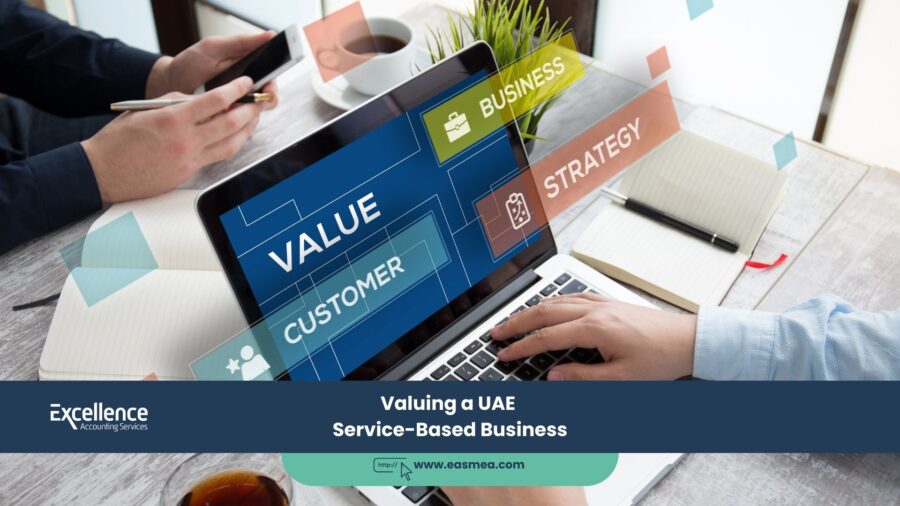A Guide to Valuing a UAE Service-Based Business
The UAE’s economy is increasingly powered by a dynamic and sophisticated service sector. From management consultancies and marketing agencies to IT service providers and law firms, these businesses are defined not by their physical assets, but by their intellectual capital, client relationships, and brand reputation. When it comes to determining the value of such a business, the traditional rulebook of valuation must be adapted.
Valuing a service-based business is a unique challenge. Unlike a manufacturing company with a factory and machinery, the most valuable assets of a service firm walk out the door every evening. The valuation process must therefore focus on quantifying the worth of these intangible assets and assessing the sustainability of the income they generate. This requires a nuanced approach that goes far beyond a simple look at the balance sheet.
This guide provides a comprehensive overview of how to value a service-based business in the UAE. We will explore the key value drivers, the most appropriate valuation methodologies, and the critical risk factors, like key-person dependence, that must be considered to arrive at a credible and defensible valuation.
Key Takeaways
- Intangibles Drive Value: The value of a service business lies in its intangible assets: client relationships, recurring revenue contracts, brand reputation, and the expertise of its team.
- Recurring Revenue is King: Businesses with stable, predictable, and contractual recurring revenue will always command a higher valuation multiple than those with project-based, one-off revenue.
- Key-Person Risk Must Be Assessed: A business that is highly dependent on its founder or a few key individuals carries significant risk, which will negatively impact its valuation.
- Revenue Multiples are Common: While the Income Approach (DCF) is important, the Market Approach using Revenue Multiples (e.g., a multiple of Annual Recurring Revenue) is a very common and critical methodology for service firms.
- A Professional Valuation is Essential: Given the subjective nature of valuing intangible assets, an independent, professional business valuation is crucial for any major transaction.
The Unique Value Drivers of a Service Business
To value a service business correctly, you must first understand what makes it valuable. The key drivers are very different from a product-based company.
- Human Capital: The skills, experience, and efficiency of the professional team. A business with a deep bench of talent that is not solely reliant on the founder is inherently more valuable.
- Client Relationships and Contracts: The strength, length, and quality of client relationships. Long-term contracts with a diverse range of clients are a primary value driver.
- Recurring Revenue Streams: The proportion of revenue that is predictable and recurring (e.g., from annual retainers or SaaS subscriptions) versus one-time project fees. Higher recurring revenue means lower risk and a higher valuation.
- Brand and Reputation: The strength of the company’s brand in the marketplace, which allows it to attract clients and talent and often command premium pricing.
- Proprietary Processes or Technology: Any unique methodologies, software, or intellectual property that create a competitive advantage and make the service delivery more efficient.
In a service business, you are valuing the systems and relationships that generate profit, not the physical assets used to do so.
Valuation Methodologies for Service-Based Businesses
A credible valuation will use a combination of methods to arrive at a defensible range of value. For service firms, the emphasis is heavily on the Income and Market approaches.
1. The Market Approach: What Are Similar Businesses Worth?
This approach values the business by comparing it to similar companies that have been sold or are publicly traded. For service businesses, this often involves using multiples of revenue or earnings.
- Revenue Multiples (e.g., EV/Sales or EV/ARR): This is very common for service firms, especially those with recurring revenue. The business’s revenue is multiplied by a factor derived from comparable companies. For example, a SaaS company with high growth might be valued at 5x its Annual Recurring Revenue (ARR).
- Seller’s Discretionary Earnings (SDE) Multiple: Often used for smaller, owner-operated firms. SDE is calculated by taking the net profit and adding back the owner’s salary, benefits, and any non-recurring or personal expenses. This figure is then multiplied by an industry-specific multiple.
- EBITDA Multiple: Used for larger, more established service firms with a management structure in place.
2. The Income Approach: What is the Future Cash Flow Worth Today?
This approach focuses on the future income-generating ability of the business.
- Discounted Cash Flow (DCF): This method forecasts the future cash flows of the business and discounts them back to their present value. For a service business, the forecast must be heavily scrutinized based on the stability of its client base, the strength of its sales pipeline, and its client churn rate.
3. The Asset Approach: What is the Net Value of the Assets?
This method is generally the least relevant for service businesses, as they typically have few tangible assets (e.g., laptops, office furniture). It calculates the value by subtracting liabilities from the fair market value of the assets. This approach often serves as a “floor value” but rarely captures the true going-concern value of a healthy service firm.
Unlocking the True Value of Your Service Business with EAS
Valuing a business built on intangible assets requires specialized expertise. At Excellence Accounting Services (EAS), we understand the unique dynamics of the UAE’s service sector.
- Specialized Business Valuation for Service Firms: We provide independent, credible valuation reports that focus on the true drivers of your business’s value—your clients, your team, and your recurring revenue.
- Financial Due Diligence: For buyers of service businesses, we conduct rigorous financial due diligence, with a focus on validating recurring revenue streams and assessing customer concentration risk.
- Strategic CFO Services: We can act as your strategic advisor to help you *increase* the value of your service business by focusing on improving the key metrics that buyers and investors look for, such as building recurring revenue and reducing key-person dependence.
Frequently Asked Questions (FAQs)
The quality and predictability of its earnings. A business with a high percentage of contractual, recurring revenue from a diverse client base will always be valued more highly than a business with lumpy, project-based revenue from a few large clients.
This “key-person risk” is a major factor that reduces a valuation. The valuator will apply a discount to the final value to reflect the risk that clients and revenue may be lost when the owner leaves. A successful transition plan and a long handover period can help mitigate this discount.
There is no single “typical” multiple. It can range from less than 1x annual revenue for a small, owner-dependent firm to over 10x for a high-growth, scalable SaaS company. The multiple depends on growth rate, profit margins, customer churn, and the overall risk profile.
A strong brand is an intangible asset whose value is captured in the financial performance. A good reputation allows a company to charge higher prices, attract more clients, and retain talent. These factors lead to higher and more stable cash flows, which are reflected in a higher valuation under the Income and Market approaches.
It can still be valued based on its history of consistent earnings and client retention. However, the lack of contracts increases the perceived risk. The valuation will rely on proving a consistent track record and demonstrating a strong, repeatable sales process. The valuation multiple will likely be lower than for a contract-based business.
Churn is the rate at which you lose customers over a given period. It is a critical metric for any subscription or retainer-based service business. High churn is a major red flag as it means the company has to constantly spend money to replace lost clients, and it indicates a potential problem with the service itself.
It has a significant positive impact. Documented processes (Standard Operating Procedures, or SOPs) show that the business is not just a collection of people, but a scalable system. It reduces key-person dependence and gives a buyer confidence that the operations can continue smoothly after an acquisition.
SDE is a measure of the total financial benefit an owner derives from their business. It’s calculated as: Net Profit + Owner’s Salary + Owner’s Perks + Interest + Depreciation/Amortization. It’s often used to value smaller, owner-managed service businesses where the owner’s compensation is a major part of the cash flow.
The best preparation is to focus on the key value drivers. Work on securing long-term contracts, diversifying your client base, documenting your processes, and developing a strong second-tier management team to reduce dependence on yourself. And, of course, ensure your financial records, managed by a professional bookkeeping service, are clean and accurate.
Because valuing the intangible assets of a service business is highly subjective. An independent, professional valuation provides an objective, defensible number that can be used for negotiations with buyers, partners, or family members. It removes emotion and bias from the process and provides a credible basis for a major financial transaction.
Conclusion: Valuing the Intangible
Valuing a service-based business is a journey into the heart of what makes a modern company successful. It’s an assessment of relationships, reputation, and the intellectual capital of a talented team. By focusing on the key drivers of sustainable income and using methodologies that correctly capture the value of intangible assets, owners and investors can gain a true understanding of a service firm’s worth, paving the way for fair transactions and successful future planning.
What is Your Service Business Really Worth?
Contact Excellence Accounting Services for a confidential consultation and an expert valuation tailored to the unique dynamics of your service-based business.




